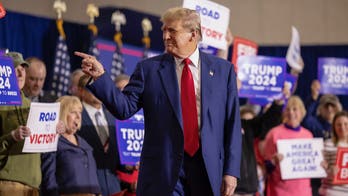Study: Major problems with voter registration system
Nearly 1 in 8 registrations found to be inaccurate
An antiquated voter registration system is to blame for listing 1.8 million dead people as registered "active" voters in the United States, the Pew Center on the States concludes in a new study that shows millions of mistakes in voter rolls across the nation and recommends online sign-up.
The study found 24 million voter registrations, or one out of every eight, were no longer valid or are significantly inaccurate. Beside the nearly 2 million dead potential voters, 12 million registrations had the wrong address and 2.75 million voters were registered in more than one state.
"The system has been using technology that's really paper-based, mail-based, 19th century technology for a long, long time and it hasn't moved into the 21st century yet," Pew Election Initiatives Director David Becker said.
Election administrators say many of these mistakes occur when people move, or change their names. People often remember to update their driver's license, but don't realize their records are not automatically cross-referenced by a state computer. In most places, voters have to re-register separately.
Eight states are doing something to change that.
Colorado, Delaware, Maryland, Nevada, Oregon, Utah, Virginia and Washington are creating a central, computerized database to share information with each other. This will help states electronically, and more quickly, verify if one of their voters has moved or died out of state.
"Twenty-first century technology really affords election officials the opportunity to better serve their voters," said Becker, "by having more accurate lists, more convenient and more cost effective ways of being on those lists, and obtaining more accurate records."
Another cause for error lies in the early voter registration paperwork, say election administrators. Forms filled out by hand can be hard for election workers to read. That's why more and more states are starting to offer online registration.
Voters will have control over their voter registration data, and will be able to update it themselves online. Maryland's system goes live July 2012.
"That will eliminate a lot of the data entry errors that result from trying to read people's handwriting or because you have temporary folks making the normal human errors in data entry," said Linda Lamone, administrator of elections for the state of Maryland.
Arizona, Colorado, Indiana, Kansas, Louisiana, Nevada, Oregon, Utah, and Washington already offer online voter registration.
But that method worries some critics who fear signing up in cyberspace is not as secure as old-fashioned pen and paper.
"I really think that the paper registration system, while may be a bit more cumbersome for a voter because they have to fill it out a piece of paper using a pen, as opposed to going online and using a mouse, is a lot more secure," said Michael Ertel, supervisor of elections for Seminole County, Fla.
"This is voter registration. This is our elections," said Ertel, "It's the most sacred democratic process that we take part in here in the states and I think that we need to maintain the security of it."
States that currently use online registration say it is actually more secure than paper applications.
To log-in, voters must prove their identity in multiple ways, which states say can help prevent voter fraud. For example in order to alter your registration in Oregon, you must enter your first and last name, date of birth, driver's license number and residential zip code.
States also report online registration saves taxpayers millions of dollars in fewer paper print-outs and wasted postage on mail sent to the wrong address. Arizona, which was the first to start online registration in 2002, reports saving more than $1 million over five years in Maricopa County alone.
Lamone says she hopes Maryland's participation in the Pew project makes it easier for people to vote, regardless of their party affiliation.
"It's a nonpartisan effort. You've got red states, blue states and states in between," she said. "We all want better cleaner registration rolls and want to try and get more people registered. We don't care how they register, we just want to get them registered and participating in the process."
If you suspect voter or election fraud where you live, tell us: Voterfraud@foxnews.com.





